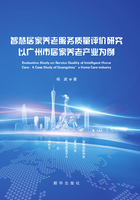
Abstract
The problem of aging in society has become a global problem, as a new type of pension model, the wisdom home care service in the pension careers play an important role. But in theory, the research on the evaluation of the quality of home care service is still a theoretical blank, and the practice community also urgently needs a set of effective service quality evaluation system. This thesis attempts to develop a smart home care service quality evaluation scale, establish the evaluation model, analyzes the influencing factors of service quality, and finally put forward some recommendations.
The results of this thesis are as follows: firstly, this study is based on five dimensions:tangibility, reliability, responsiveness, empathy and ease of use. And the scale of the intelligent home care service quality built by this thesis has passed the test of reliability and validity. Secondly, the five dimension weights calculated by G1 method are 0.107,0.346,0.216,0.180 and 0.150respectively. The weights calculated by entropy method are 0.092,0.452,0.148,0.191 and 0.117 respectively. The proportion of subjective weight and objective weight calculated by ideal method is 0.511 and 0.489 respectively. Finally,the ranks of the dimensions of the evaluation from high to low are: reliability, ease of use, timeliness, tangibility and empathy. The influence of personal characteristics such as age, education level, income level, self - care ability and whether or not they have suffered from major diseases on the quality of service are significantly different.
The innovation of this thesis has the following three points: First of all, using the method of literature research and expert interviews, this thesis abstracted the Intelligent Home Care service quality of the dimensions, buildt a theoretical model, and developed a Intelligent Home Care service quality scale with good reliability and validity. What is more, the subjective weight of evaluation index of Intellectual Home Care service quality was determined by G1 method. Entropy weight method was used to determine the objective weight of evaluation index. Based on the ideal program method, subjective weights and objective weights were combined and weighted. And this thesis developed the Intelligent Home Care service quality evaluation model. Last but not least, this thesis appraised the quality of service in Guangzhou by using the evaluation model of Intellectual Home Care service quality, analyzed the difference of service quality among different dimensions by using the method of single factor analysis and regression analysis, and explored the difference of personal characteristics to service quality. By establishing evaluation system of intelligent home care service quality, this thesis promote the construction of the service system, so as to promote the development of the intelligent home care service's business model.
Keywords: Intelligent Home Care; Scale Development; Evaluation of Service Quality;G1; Entropy Weight Method